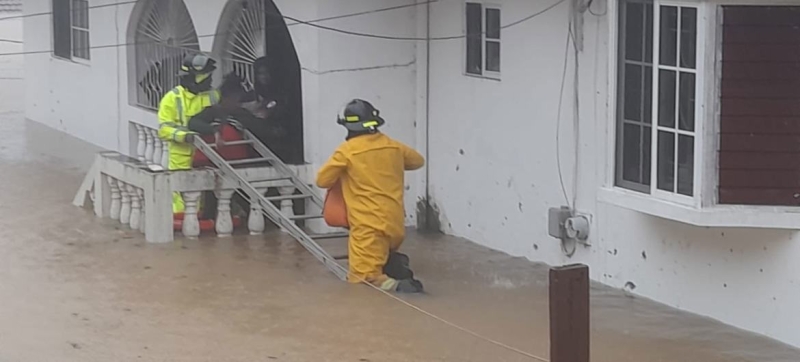- BNP moves to finalise seat sharing as alliance friction grows |
- BNP plans universal 'Family Card' for all women: Tarique Rahman |
- Tangail saree weaving gets recognition as intangible cultural heritage |
- Chuadanga farmers thrive as cauliflower yields hit new high |
- Jamaat and allies set to begin seat-sharing discussions from Tuesday |
Guterres Urges Global Support for Jamaica’s Recovery

Rescue workers in Jamaica help residents following the catastrophic flooding caused by Hurricane Melissa.
UN Secretary-General António Guterres expressed solidarity with the people of Jamaica on Sunday as they struggle to cope with the devastating aftermath of Hurricane Melissa.
Guterres spoke by phone with Jamaica’s Prime Minister Andrew Holness earlier in the day and later emphasised in a statement that “international support is crucial” as the country deals with the effects of the Category 5 storm, which brought torrential rain, storm surges, and catastrophic flooding.
“He calls for the mobilisation of massive resources to deal with the loss and damage from the hurricane,” said the UN Deputy Spokesperson.
UN Provides $4 Million Aid Injection
The UN Emergency Relief Coordinator, Tom Fletcher, has allocated $4 million from the Central Emergency Response Fund (CERF) to help agencies and partners rapidly scale up humanitarian operations in Jamaica.
Five days after the most powerful storm in the island's history made landfall in the west, many residents are still waiting for aid to arrive, according to local reports, as numerous roads remain inaccessible and many communities are without power or running water.
The government reported on Saturday that the death toll has risen to at least 28. The UN’s top official in Jamaica, Dennis Zulu, said around 13 UN agencies are working with authorities to clear roads and carry out essential repairs.
“My team here remains committed to ensuring that Jamaica gets back on its feet,” he said.
Support for Vulnerable Children
UNICEF said on Saturday that more than 700,000 children across the Caribbean have been affected by the hurricane, which also made landfall in Cuba and caused severe disruption in western Haiti.
The agency is supporting the Jamaican government to reach over 284,000 children with urgent nutrition aid, access to safe water, sanitation and hygiene, and mental health support.
In Haiti, UNICEF is distributing hygiene and emergency health kits, providing cash assistance to at-risk households, and engaging local communities.
UN aid coordination office OCHA worked with UNICEF at José Martí Airport in Cuba on Saturday to unload supplies for more than 90,000 people affected by Hurricane Melissa, alongside national authorities, as part of a unified emergency response.
International Solidarity ‘a Lifeline’
UN relief chief Tom Fletcher said on Friday, “In times like this, international solidarity isn’t just a principle – it’s a lifeline.”
An OCHA team has been deployed to Jamaica to strengthen coordination and information management. UN agencies and NGOs are working to restore access, deliver emergency health and water services, and support communities whose homes, schools, and hospitals were damaged.
Well-Prepared in Cuba
A separate $4 million allocation from the CERF for Cuba allowed UN agencies to position life-saving supplies before the storm hit.
The World Food Programme (WFP) provided food for 180,000 people.
UNICEF deployed mobile water-treatment units and hygiene kits.
The Pan American Health Organization (PAHO) airlifted medical supplies and generators.
The Food and Agriculture Organization (FAO) and UN Development Programme (UNDP) moved seeds and tarpaulins to protect livelihoods and homes.
The UN Population Fund (UNFPA) distributed health and dignity kits.
The Cuban Red Cross assisted with preventive evacuations, early-warning messages, and psychosocial support, in coordination with the International Federation of Red Cross (IFRC).
Early Warnings Across Haiti
In Haiti, already reeling from a deep humanitarian crisis and armed violence, humanitarian teams are working with national authorities to address urgent needs.
Several days before the hurricane struck, a $4 million CERF allocation allowed aid to be pre-positioned. More than 3.5 million alerts were sent to vulnerable populations, helping save lives.
UN agencies and partners are now supporting temporary shelters and providing food, non-food items, and cash assistance.
“Local leadership, global solidarity, and early action are saving lives across the region,” Fletcher said. “This is the humanitarian reset at work — acting together with greater impact.”

